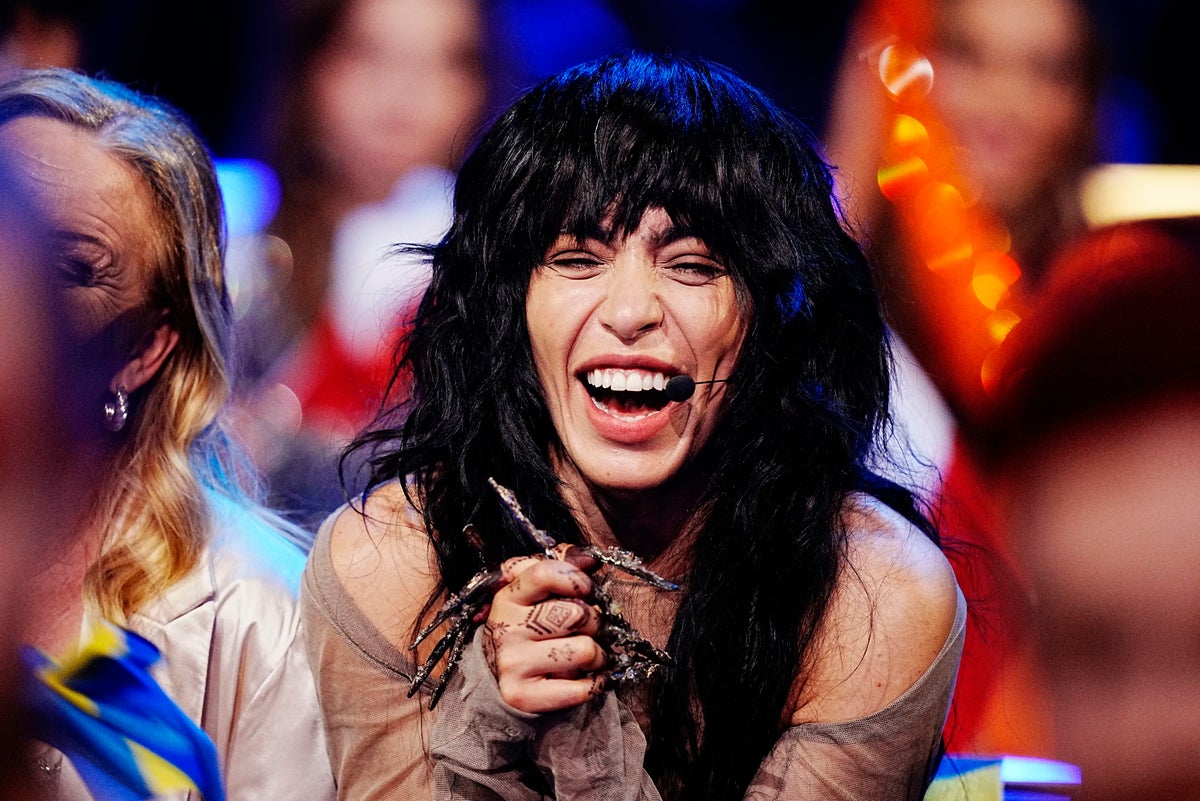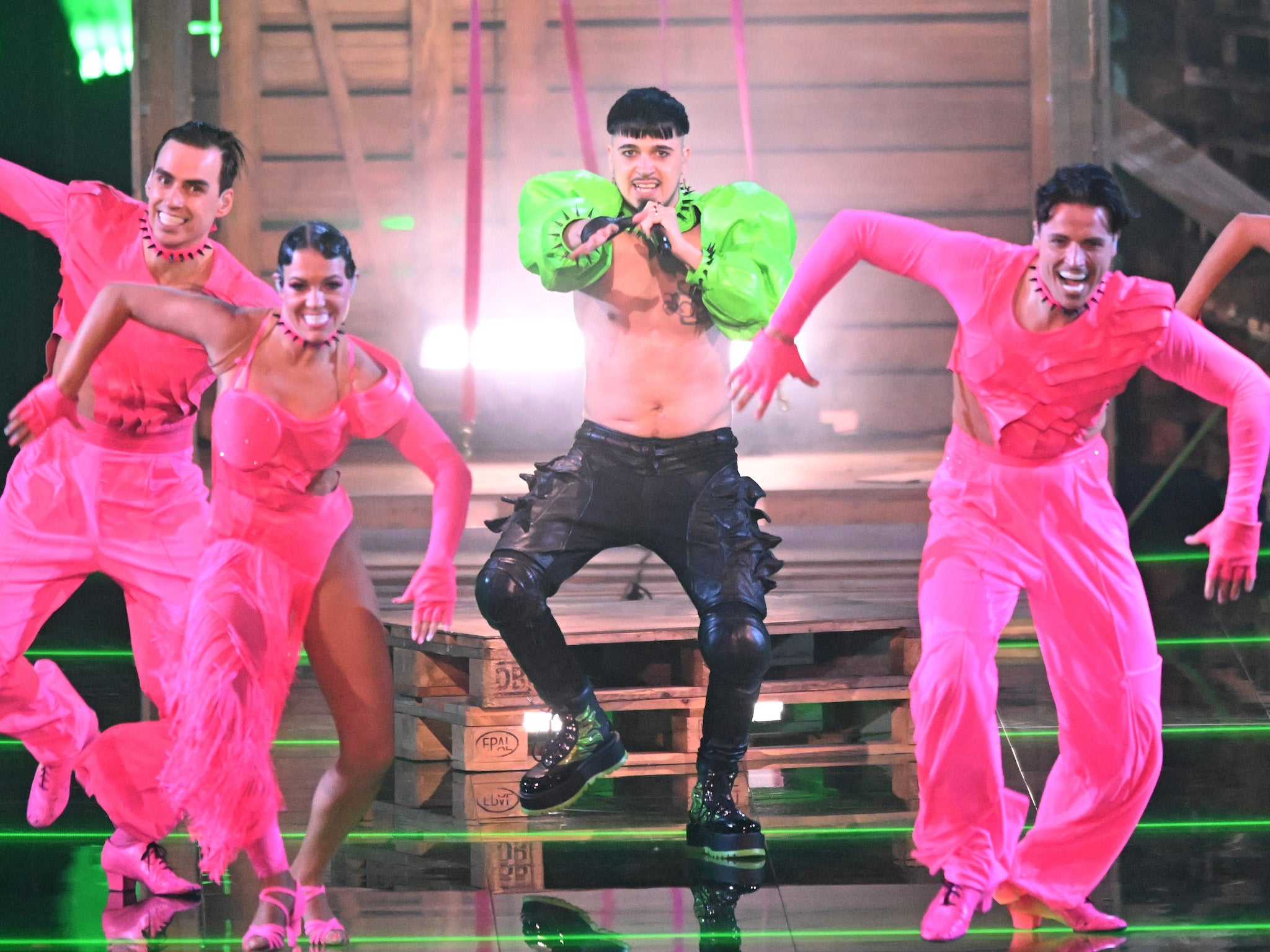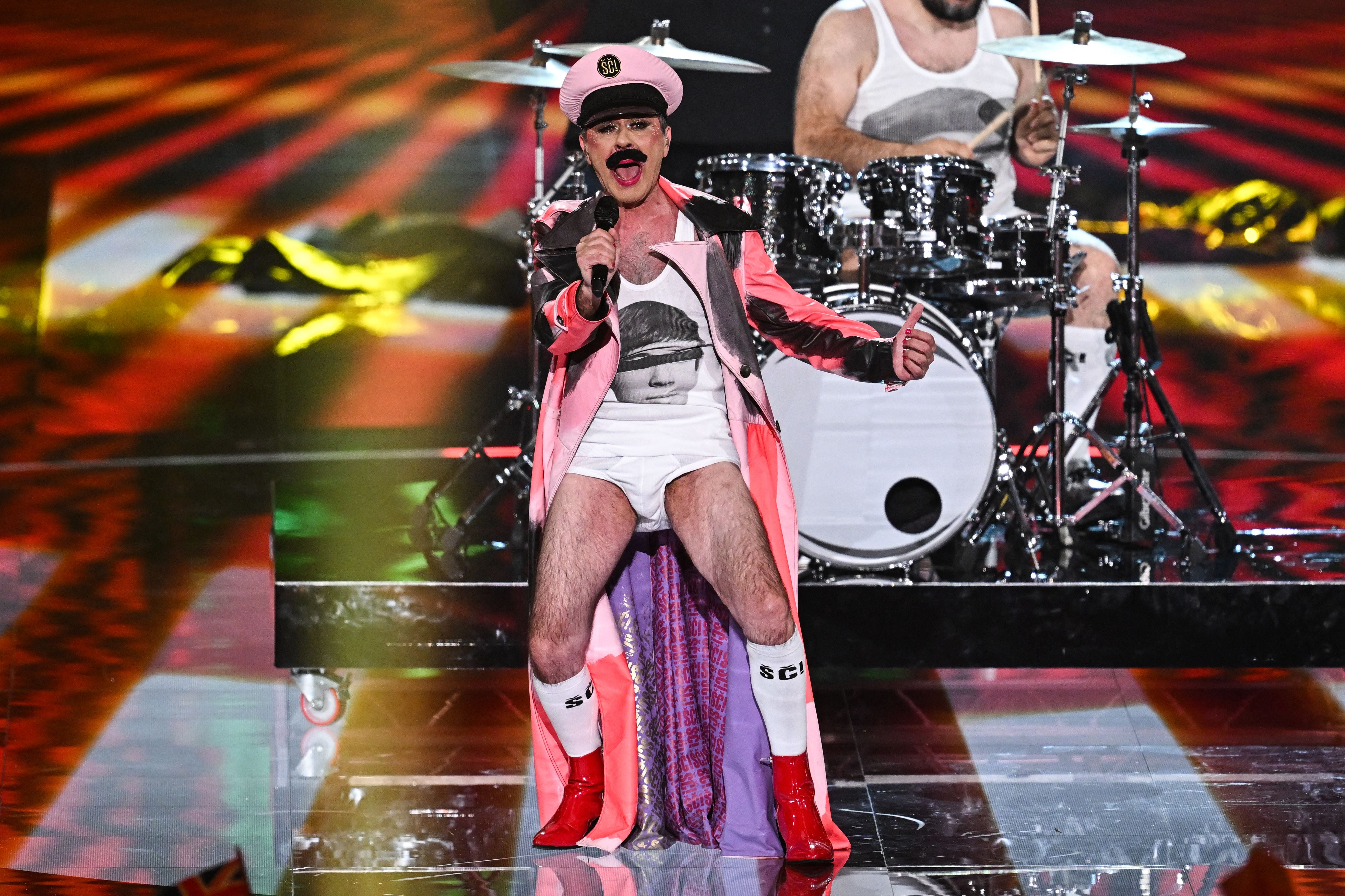
As the bucket-hatted yetis of the Kalush Orchestra open proceedings by recreating 2022’s winning song “Stefania”, with the Princess of Wales adding piano on video, that tang in the air, could it be… optimism? Since the rocket-voiced Afghan hound of British hero pop, Sam Ryder, defied this cynical writer’s expectations (almost) and (in a round-about way) brought Eurovision home for 2023, the arrival of music’s very own Wacky Races comes with a rare sense of national celebration.
Clearly suffering enough for its foot-shooting isolationism – and with its government looking increasingly like a special edition of The Wheel for self-serving incompetents – Britain has been mercifully unshackled from the bottom of the Eurovision table at last. And the cheese-pop addicts of the M&S Bank Arena in Liverpool, hosting for Ukraine, greet the arrival of this year’s entry Mae Muller during the flag parade like the month’s second coronation. “It’s hit me,” says Mel Giedroyc, sitting in while Graham Norton finally gets his turn in front of the camera. “I’m emotional.”
If Liverpool is Britain’s official musical epicentre, it likely never expected aftershocks like this. The contest proper opens with Austria’s Teya & Selena strutting through an operatic rave pop tune called “Who the Hell is Edgar”, about being possessed by the spirit of Edgar Allen Poe but still not being able to make songwriting pay the rent. Despite a masterfully sly reference to Spotify’s cent-per-stream rate (“zero, dot, zero, zero, three”) it’s unlikely Poe had much input into lyrics like “his brain is in my hand and it’s moving really fast”. He might well have curated much of the first half of the bill, though.
Serbia’s Byronesque Luke Black rises poetically from a grotesque mushroom bed to act out a tech-pop video game battle. In Albina & Familja Kelmendi, Albania have sent a Hammer Horror sacrifice scene reworked as a Balkan anthem to divorce. Estonia’s Alika attempts to summon the ghost of Adele’s 19 album with the help of a haunted piano. And Sweden have shipped in a containment box carrying a woman, Earth name Loreen, who appears to be the result of human cross-breeding with an EDM Predator. “Blood on your God’s head, you can’t steal our souls,” sing Vesna, Czechia’s terrifying electro-goth coven, defined by their yoga-friendly uniform and hair plaits so long you can lash the stage with them. Come back Subwoolfer, have this banana, all is forgiven!
Seriously, when did Eurovision get so dark? Most of the early entrants are heartbroken, wartorn and/or actively yearning for death. Andrew Lambrou, representing Cyprus amid a catastrophic roof leak, is “bleeding out”. Another tormented big balladeer, Switzerland’s Remo Forrer, sings of a child playing with toy soldiers only to grow up into a real-life warzone. “I don’t want to be a soldier, I don’t want to have to play with real blood,” he yowls, possibly in solidarity with Ukraine or possibly here to cue up more Swiss neutrality in any forthcoming Europe-wide conflict.
Over her chest-slapping, skirt-flapping flamenco showtune “Ai Coracao”, Portugal’s Mimicat sounds, in translation, like Patient Zero for a new Covid mutation: “My chest is burning, my mouth is dry…I feel dizzy, and worse every day”. And France’s La Zarra, an electropop Edith Piaf, declares “My heart, my hands, my eyes, my kidneys don’t belong to me anymore” as if recently mugged for her vital organs.
Spain’s Blanca Paloma stands out with “Eaea”, a breathtaking performance that breaks innumerable Eurovision rules: un-Googleable title, art-pop staging, total lack of concern for being catchy, lyrics written as a message from her grandmother full of symbolism (moons, shrines, death again) inspired by Spanish poet Federico Garcia Lorca. It’s like St Vincent gone flamenco and arguably ushers in a new genre: post-vision. Otherwise, those translated lyrics act as comedic counterpoint to all the soul baring. Impassioned bellow ballad “Due Vite” from Italy’s Marco Mengoni – “the last song before the moon will burst” – has a chorus that apparently goes: “We’re a book on the floor in an empty house that resembles ours… We screwed another night outside of a club/Thank goodness”. Which all sounds rather… I’m sorry, the moon’s going to what now?

Thankfully, the sight of Finland’s rave pop freak Kaarija – Keith Flint attitude, Hulk arms, Gavin from The Office haircut – riding a human centipede of flamenco dancers marks the arrival of that traditional portion of Eurovision where you start to think your TV has taken drugs. Did we really catch sight of Giedroyc dressed as a Scandinavian milkmaid and pumping away at a churn? Yes, yes we did.
By the minute, new worlds are woven. Australia’s Voyager take us back to a cyber-metal future of rolled-up blazer sleeves, keytars and sci-fi 1980s sports cars. Moldova’s Pasha Parfeni, entering possibly the first ever EDM track about a pagan wedding, is a Vlad the Impaler type ruling over a Mordor full of horn-headed women and a dwarf Pan. In Alessandra, Norway has managed to find a cross between Charli XCX and Penny Mordaunt to sing its electropop Viking pillage tune “Queen of Kings”, while Germany have sent Hell’s poshest harpy and his thrash metal imps in the shape of Lord of the Lost. And if anybody can tell me what on earth I watched during Croatia’s “anti-war song” “Mama ŠČ!” – the military-themed drag queens! The rocket wielding Rasputin! The bit in their pants! – my DMs are open.

Most likely to do a Maneskin, to these ears, are Joker Out, a bunch of camera-loving indie rock poseurs and Slovenia’s most streamed band, who seem to have forgotten their outfits and been forced to do their slicked-up Arctic Monkeys homage “Carpe Diem” dressed in whatever they could find in Eurovision’s lost wardrobe department. But Liverpool’s hopes of a home win are dashed by Mae Muller’s Tiger Tigerish rendition of “I Wrote a Song”. An innocuous Latin-pop confection, it’s outclassed by the night’s other pop writhers such as Israel’s Noa Kirel, Poland’s budget Britney Blanka or Armenia’s Brunette, whose Billie Eilish-esque “Future Lover” switches from forlorn to stridently horny and back again like a happy hour Hinge date.
Indeed, after an interval show featuring a cabaret turn from the UK’s 1993 representative Sonia and a borderline sacrilegious medley of Liverpool songs by previous entrants, and two hours of music that runs an impressive gamut of mainstream pop, it’s Sweden’s pop xenomorph for the win for the second time with Loreen. Poe couldn’t have scripted it better.







